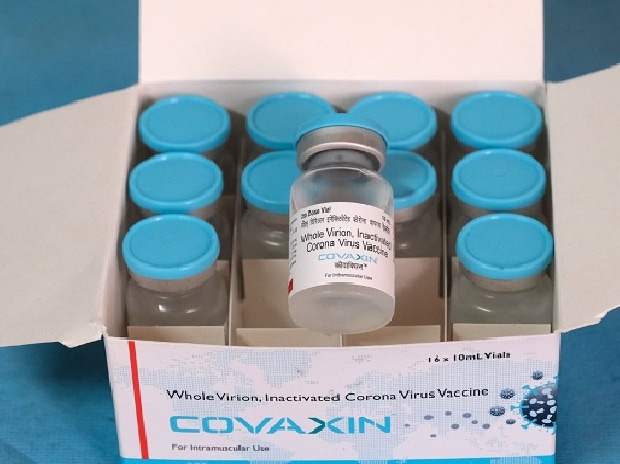Two doses of Covaxin, the India-made vaccine, are 50 per cent effective against symptomatic Covid-19, said an independent study by researchers based on real-world assessment .
Results of the interim study, which was published in The Lancet Infectious Diseases Journal, showed that two doses of the vaccine manufactured by Bharat Biotech Covaxin, also known as BBV152, had 77.8 per cent efficacy against symptomatic disease and present no serious safety concerns..
The study titled ‘Effectiveness of an inactivated virus-based SARS-CoV-2 vaccine, BBV152, in India: a test-negative, case-control study’ assessed 2714 hospital workers at the All India Institute of Medical Sciences (AIIMS) in Delhi, from April 15–May 15, who were symptomatic and underwent RT-PCR test for Covid-19 detection.
The researchers, including doctors Manish Soneja, Adil Rashid Khan, Devashish Desai, Ankit Mittal and others, said that they received no funding for the study and protocol for it was approved by AIIMS ethics committee.
Researchers also noted that the Delta variant was the dominant strain in India during the period of the study. At that time, the Delta variant approximately accounted for 80 percent of all confirmed Covid19 cases.
Of the 2,714 employees in the study population, 1,617 people tested positive for SARS-CoV-2 infection, the virus that causes COVID-19, and 1,097 tested negative.
Researchers evaluated the effectiveness of the vaccine against symptomatic RT-PCR confirmed SARS-CoV-2 infection. The study found that the vaccine effectiveness against symptomatic Covid-19 after two doses of Covaxin with the second dose administered 14 or more days before undergoing RT-PCR testing was 50 per cent. The researchers also added that effectiveness remained stable over the seven-week follow up period.
“The vaccine effectiveness estimated in our study is lower than the efficacy announced after completion of the phase 3 trial, despite a similar testing strategy being used (SARS-CoV-2 RT-PCR testing for participants with symptoms suggestive of COVID-19 determined through weekly telephone follow-up),” the researchers noted in the study.
They reasoned that several factors might be responsible for the observation of a lower effectiveness in this study.
“First, the population included in our study comprised only hospital employees, who might have been exposed to a higher risk of SARS-CoV-2 infection than the general population,” the said. The research was conducted during the peak of India's second wave of COVID-19 with high test positivity rates for both hospital employees and residents of Delhi, they said. “On April 26, 2021, the test-positivity rate for Delhi was around 35%, which was the highest it had been since the beginning of the pandemic,” the researchers noted.
“Thus, our results might only reflect the performance of BBV152 under such surge conditions,” they added.
The prevalence of circulating variants of concern, especially the delta variant, might have contributed to lower effectiveness of BBV152.
“Although in-vitro studies have shown neutralisation of these variants by both convalescent and post-vaccine sera, the neutralisation titres are several times lesser against variants, particularly the delta variant,” the study noted.
The phase 3 trial of BBV152 was conducted during a period when the overall test-positivity rate was low, and the prevalence of the delta variant among positive cases was largely unknown.
“By contrast, at the end of April, 2021, a period during which this study was conducted, the delta variant was the dominant strain, making up more than 80% of all sequenced genomes as per the reports from the Indian SARS-CoV-2 Genome Sequencing Consortia,” the authors noted.
The researchers acknowledged several limitations to their study. It does not estimate the vaccine effectiveness against hospitalisation, severe disease, and death, which require further assessment, they noted. The study was not designed to estimate vaccine effectiveness for different time intervals after vaccination or to determine if vaccine effectiveness changed over time, they said.
 Dear Reader,
Dear Reader,
Business Standard has always strived hard to provide up-to-date information and commentary on developments that are of interest to you and have wider political and economic implications for the country and the world. Your encouragement and constant feedback on how to improve our offering have only made our resolve and commitment to these ideals stronger. Even during these difficult times arising out of Covid-19, we continue to remain committed to keeping you informed and updated with credible news, authoritative views and incisive commentary on topical issues of relevance.
We, however, have a request.
As we battle the economic impact of the pandemic, we need your support even more, so that we can continue to offer you more quality content. Our subscription model has seen an encouraging response from many of you, who have subscribed to our online content. More subscription to our online content can only help us achieve the goals of offering you even better and more relevant content. We believe in free, fair and credible journalism. Your support through more subscriptions can help us practise the journalism to which we are committed.
Support quality journalism and subscribe to Business Standard.
Digital Editor

RECOMMENDED FOR YOU